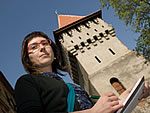 Sibiu in Transylvania is a historic town.
Sibiu in Transylvania is a historic town.
The waves of Romans, Turks, Huns and Saxons that swept through the area over the centuries have left a legacy that attracts culture-seekers from far and wide. But one person with a professional interest in the region is anthropologist Monica Stroe.
“I’m studying the Saxon heritage of Southern Transylvania,” says the 24-year-old. “I started my PhD six months ago.”
Her work focuses on how the cultural and tourist industries tap into the area’s rich and diverse history and traditions. “I chose the Saxon areas for personal reasons,” she says. “I was born and grew up in a town founded by the Saxons where many medieval aspects remain. But I have always thought that Sibiu has made more of its heritage.”
Sibiu has made the most of its traditional elements, with a meticulously restored medieval city centre. The city was the European capital of culture in 2007 and hosts many internationally renowned events. For Monica, this was an ideal time to develop a case study. “I was interested to see how Sibiu developed its ‘brand’ and how this has affected surrounding areas.”
Her research covers a wider area in the Southern Transylvanian region. “I’m really interested in the rural areas – how they are now promoting themselves as cultural destinations,” she says.
“Another important aspect is that there is an ethnic paradox here,” she continues. “The mayor is German, yet only around 1.6% of the population are German origin – it’s a phenomenon happening throughout the region.”
Time for academic research
Monica’s PhD studies continue on from her Masters degree in nationalism studies and ethnic relations at the Central European University in Budapest. After qualifying, she knew she wanted to continue studying related topics.
“My Masters looked at the dynamics of ethnic groups, regional identities and conflicts,” she says. “It made me more aware of the difference between ethnic groups. I’m interested as to how identities are constructed.”
However, when she returned to Bucharest where she had originally studied, opportunities for academic research were scarce and underpaid. She was considering a change of direction: “I was thinking of going into market research work. It would have been a compromise, but continuing to study was looking financially unviable.”
Help came through a scholarship, co-funded by the European Union through the European Social Fund. “[The grant] really mattered to me. It gave me the chance to stay in my chosen field. I wouldn’t have been able to start a PhD without it.”
She receives a monthly stipend to cover her living expenses during the three years of her studies. And it also enables her to spend eight months in foreign universities across the EU and access the libraries and materials essential to her work. “Having that mobility is vital for my research,” she says. “It gives me the opportunity to travel. I can get access to important archives and get a wider perspective.”
As part of the programme, she will write articles for academic journals and work with professors. “It gives me good experience and the support that I need to focus on long-term field research,” she says
Looking to the future, she says: “I’m hoping that the PhD will open up doors. I want to improve my research skills and consolidate my theoretical background.
“Ideally, I’d eventually like to work in community development. But it is early days, I’m concentrating on my research,” she concludes.
